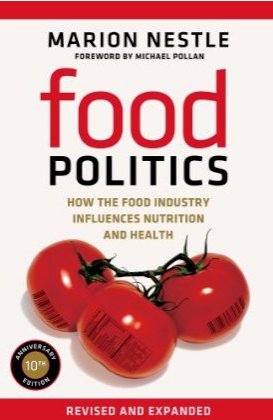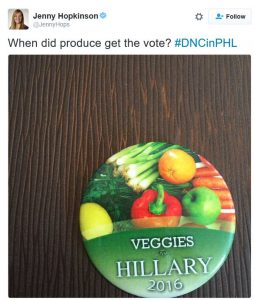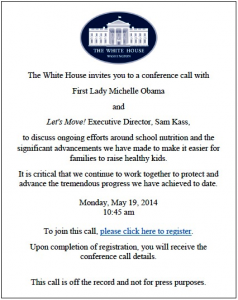Food Politics: How the Food Industry Influences Nutrition and Health
Happy Anniversary Food Politics.
The Tenth Anniversary Edition is out with a new Foreword by Michael Pollan. It also has new Preface and a new Afterword, in which I bring food politics up to date.
Order from your local independent bookstore or Amazon or UC Press or Barnes & Noble
Summary
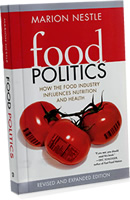 We all witness, in advertising and on supermarket shelves, the fierce competition for our food dollars. In this engrossing exposé, Marion Nestle goes behind the scenes to reveal how the competition really works and how it affects our health. The abundance of food in the United States—enough calories to meet the needs of every man, woman, and child twice over—has a downside. Our overefficient food industry must do everything possible to persuade people to eat more—more food, more often, and in larger portions—no matter what it does to waistlines or well-being.
We all witness, in advertising and on supermarket shelves, the fierce competition for our food dollars. In this engrossing exposé, Marion Nestle goes behind the scenes to reveal how the competition really works and how it affects our health. The abundance of food in the United States—enough calories to meet the needs of every man, woman, and child twice over—has a downside. Our overefficient food industry must do everything possible to persuade people to eat more—more food, more often, and in larger portions—no matter what it does to waistlines or well-being.
 Like manufacturing cigarettes or building weapons, making food is very big business. Food companies in 2000 generated nearly $900 billion in sales. They have stakeholders to please, shareholders to satisfy, and government regulations to deal with. It is nevertheless shocking to learn precisely how food companies lobby officials, co-opt experts, and expand sales by marketing to children, members of minority groups, and people in developing countries. We learn that the food industry plays politics as well as or better than other industries, not least because so much of its activity takes place outside the public view.
Like manufacturing cigarettes or building weapons, making food is very big business. Food companies in 2000 generated nearly $900 billion in sales. They have stakeholders to please, shareholders to satisfy, and government regulations to deal with. It is nevertheless shocking to learn precisely how food companies lobby officials, co-opt experts, and expand sales by marketing to children, members of minority groups, and people in developing countries. We learn that the food industry plays politics as well as or better than other industries, not least because so much of its activity takes place outside the public view.
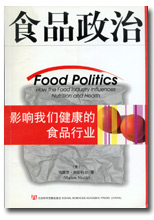 Editor of the 1988 Surgeon General’s Report on Nutrition and Health, Nestle is uniquely qualified to lead us through the maze of food industry interests and influences. She vividly illustrates food politics in action: watered-down government dietary advice, schools pushing soft drinks, diet supplements promoted as if they were First Amendment rights.When it comes to the mass production and consumption of food, strategic decisions are driven by economics—not science, not common sense, and certainly not health.
Editor of the 1988 Surgeon General’s Report on Nutrition and Health, Nestle is uniquely qualified to lead us through the maze of food industry interests and influences. She vividly illustrates food politics in action: watered-down government dietary advice, schools pushing soft drinks, diet supplements promoted as if they were First Amendment rights.When it comes to the mass production and consumption of food, strategic decisions are driven by economics—not science, not common sense, and certainly not health.
No wonder most of us are thoroughly confused about what to eat to stay healthy. An accessible and balanced account, Food Politics will forever change the way we respond to food industry marketing practices. By explaining how much the food industry influences government nutrition policies and how cleverly it links its interests to those of nutrition experts, this pathbreaking book helps us understand more clearly than ever.
Blurbs
“In this fascinating book we learn how powerful, intrusive, influential, and invasive big industry is and how alert we must constantly be to prevent it from influencing not only our own personal nutritional choices, but those of our government agencies. Marion Nestle has presented us with a courageous and masterful exposé.” — Julia Child
“This remarkable book is essential reading for anyone who wishes to understand how it has come to be that the richest nation in the world is eating itself to death. . . . Straight reporting about the shaping of food policy, as this volume makes clear, is certain to offend some very powerful players.” — Joan Dye Gussow, author of This Organic Life
“Food politics underlie all politics in the United States. There is no industry more important to Americans, more fundamentally linked to our well-being and the future well-being of our children. Nestle reveals how corporate control of the nation’s food system limits our choices and threatens our health. If you eat, you should read this book.” — Eric Schlosser, author of Fast Food Nation
“‘Blockbuster’ is one of the best ways that I could describe this book. . . . A major contribution to understanding the interaction of politics and science, especially the science of nutrition, it is of extreme value to virtually all policy makers and to everyone concerned with the American diet.” — Sheldon Margen, editor of the Berkeley Wellness Letter
“A devastating analysis of how the naked self-interest of America’s largest industry influences and compromises nutrition policy and government regulation of food safety. . . . A clear translation of often obscure studies and cases, the writing is accessible and lively.” — Warren Belasco, author of Appetite for Change
Reviews and Commentary
- Food Politics: Worse Than You Thought Durham Independent 5/21/03
- Resource Review – Food Politics Dietitians of Canada Members Online Newsletter 5/03
- Marketing, Not Health Townsend Letter for Doctors and Patients 5/03
- Book Review Journal of the American Dietetic Association 4/03
- Have Fat, Will Sue Financial Times 12/12/03
- Book Review The American Journal of Clinical Nutrition 12/02
- Expert Blames Obesity on Food-Industry Marketing The Seattle Times 11/6/02
- The Hunger for Profit World Watch 9/02 – 10/02
- The Soft Sell: How the Food Industry Shapes Our Diets Nutrition Action Health Letter 9/02
- Schools Teach 3 C’s: Candy, Cookies and Chips The New York Times 9/24/02
- Barbecue of the Vanities The Guardian 8/19/02
- The Food Pushers Science 7/12/02
- Digesting the Message International Association for the Study of Obesity Newsletter 2002
- Book Review The New England Journal of Medicine 6/20/02
- Exposé from a Food Policy Insider Veg Source 6/5/02
- Weighing Our Health: Epidemic of Obesity San Francisco Chronicle 5/26/02
- Food Politics Blames Industry for Obesity Epidemic Food Chemical News 5/20/02
- Food in the USA: Something to Chew Over The Lancet 5/18/02
- Food Industry Tempts us to Overeat, Professor Says Columbia Daily Tribune 5/15/02
- Book Draws Protests from Food Leaders Elsevier Food International 5/15/02
- One Woman’s Showdown with the Food Industry The New York Times 5/15/02
- Heavy Duty The New Republic 5/13/02
- Lean on Me The Economist 5/11/02
- Big Food’s Real Appetites The Nation 5/6/02
- She’s a ‘Nag’ for Detailing Big Food’s Deviousness The Philadelphia Inquirer 4/17/02
- The Campaign Against Big Food townhall.com 4/2/02
- Feeding Frenzy The Village Voice 3/26/02
- Big Fat San Francisco Bay Guardian 3/8/02
- Obesity: Should Food Industry Be Blamed? CNSNews.com 2/26/02
- Sugar-Coating the Facts (Lesson Plan) The New York Times 2/19/02
- Food for Thought for a Fat Nation USA Today 2/19/02

